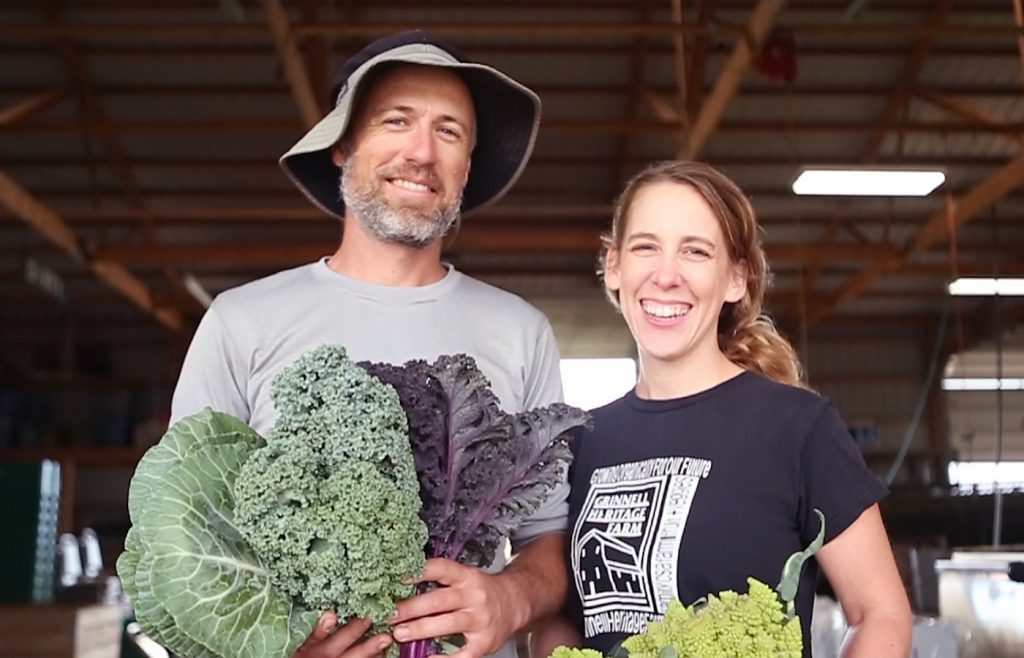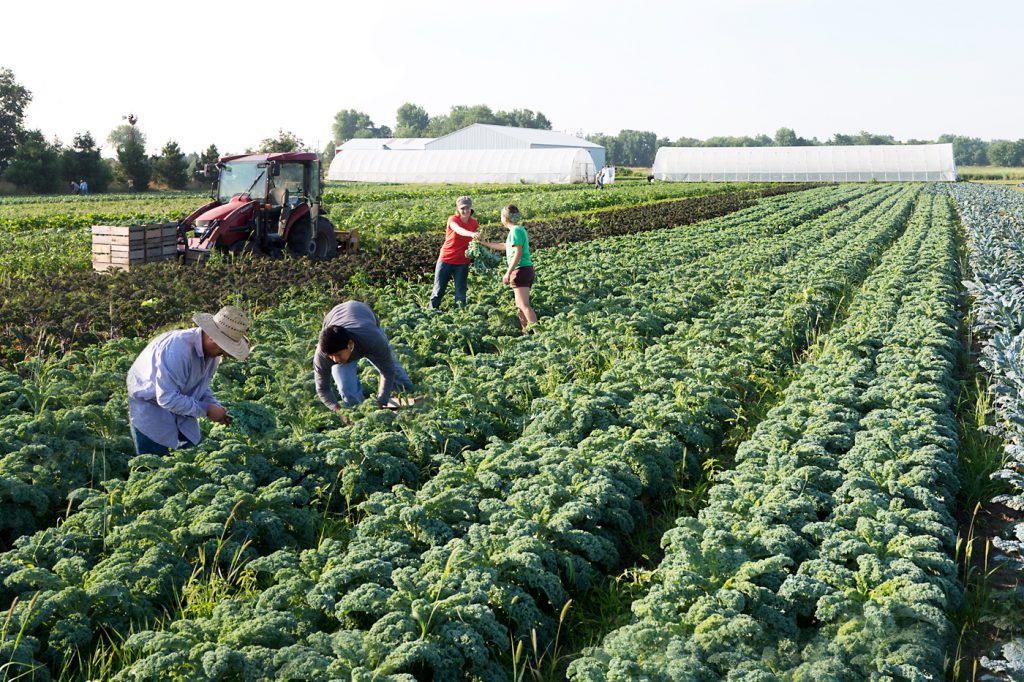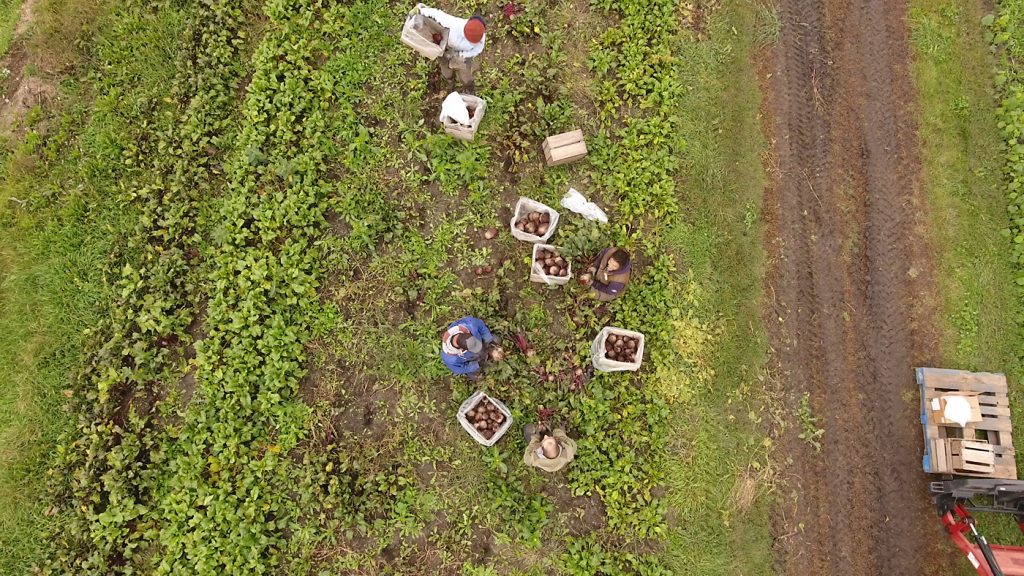
Everyone wants to make a buck stretch farther, and the rise of organic produce in big box grocery stores seems to make it easier to be a green consumer. But are you putting your money where your mouth is?
If you want to support local farmers and producers, the answer is probably no. The organic produce sold at stores like Costco, Hy-Vee, and Aldi’s generally comes from large distributors in California or Mexico.
So you’re supporting organic agriculture but not necessarily local producers.
To support local, shop at the New Pioneer Co-op. It’s in their mission statement to help local organic production by providing a market at their stores. “New Pi’s made a commitment to purchasing local and keeping that money circulating through the community,” says Marketing Manager Jen Angerer. “That doesn’t necessarily come down to the bottom line. We have to make money, but that’s not our primary goal. Our primary goal is to serve the community, promote local growing, and reduce our carbon footprint.”
Established in 1971, the New Pioneer Co-op is a locally owned, democratically controlled grocery business that promotes responsible land and animal stewardship by offering the best in organic, natural, and local food. While it’s member owned and operated, everyone is welcome and anyone can shop there.

Local farmer Andrew Dunham, of Grinnell Heritage Farm, says New Pi’s commitment to supporting local farmers is one of the primary reasons he and his wife Melissa work with them. “They’re one of the only groceries out there that must procure local and organic products,” he says.
Dunham grew up in Northeast Iowa and has been farming full time since 2007. He and Melissa grow kale, Swiss chard, beets, carrots, parsnips, and other root crops.
New Pi is unique in having contracts with their producers, guaranteeing that they will buy the products at harvest time. “They’re not just trying to get things as cheaply as possible,” Dunham says. “They’re actually trying to give farmers some stability.”
Aside from special sales, prices are the same as what producers charge at farmers markets. “We pay our local producers a fairer wage,” says Angerer. “We’re not trying to undercut them for the work they’re doing and the superior product they’re providing us.”
Beware “Local-Washing”
Dunham adds that there’s a lot of “local-washing” going on in the Cedar Rapids/ Iowa City corridor. “A lot of businesses have found out if you put the word ‘local’ up, you get a slight uptick [in sales],” he says.
As an example, Dunham says he’s had stores order one case of kale so they could use the Grinnell Farms logo, then order the rest of their kale from an out-of-state distributor. Dunham encourages consumers to do their homework to make sure stores are really offering local products.
“We’re not just greenwashing when we say we’re supporting local producers and growers,” Angerer says. “We’re actually doing it. Through contracts, we have over 135 local producers on our shelves every day. . . . It matters where you put your shopping dollars, because it trickles down through your whole community.”
About 32 producers are local farmers and another 10 to 12 are local meat and egg producers. “When our sales go down,” she says, “so do theirs. Our competition is not supporting local growers.”

Even though local farmers like the Dunhams are usually price competitive with organic produce coming out of California, many grocery stores find it easier to place one order from their central distribution center and get it all on one truck, instead of having to coordinate with four or five producers. This may be cheaper short term, but it has long-term effects on the local economy.
“It’s really heartbreaking for us to watch the farmers struggle, since we don’t have the sales we used to have,” says Angerer.
Does It Really Cost More?
There’s a common misconception that New Pi is more expensive. “In reality,” says Angerer, “when you compare an organic apple to an organic apple, we’ve got lower prices. Our Organic Valley Milk is 60 cents cheaper than anywhere else in town, and our everyday price for Hen House eggs, $1.99, matches sales at other places. We do price checks on a quarterly basis, making sure our prices are competitive.”
In addition, New Pi has a basics program in which prices have been lowered on almost 500 staples like eggs, milk, carrots, bread, mac and cheese, and juices.
Dunham says some people look at him cross-eyed for shopping at New Pi because they think it’s expensive, but shopping the sales and buying commonly used items by the case at discounted prices makes things pretty affordable.
Local Food is Safer
Another great thing about local food, Angerer says, is that you know where your food comes from. All of the recent food scares have involved vast national food processing networks that took time to trace, like the recent romaine lettuce scare. Since the origin was unknown, including whether it was organic or conventional, all romaine had to be pulled and thrown away until it could be traced.
“Local food is very traceable,” Angerer says. “With local food, it takes one phone call, one visit.” New Pi staff make frequent visits to their farmers and stay familiar with their handling processes. Big commercial growers, on the other hand, usually send their products to a production facility. With hundreds of producers sending their wares, tracing them becomes extremely difficult.
“Everytime there is a food scare, we see a little spike in sales,” Angerer says. “I think it’s fresh in people’s minds. Eating local, you know what you’re putting in your body is safe.”
Better All Around
Because New Pi works with producers who are committed to sustainable farming practices, shopping there has a positive environmental impact. Angerer says that while local food sometimes costs a bit more, the benefits far outweigh the extra pennies spent. “Farmers are getting paid a fair wage for a superior product, it tastes better, it’s not going to make you sick, the animals are raised humanely, and the soil was not pumped full of chemicals, pesticides, and herbicides.”
Our actions have ramifications, and our grocery shopping choices can affect our our community, our local economy, and our environment. “We’re not trying to guilt people,” Angerer adds. “We all care about the planet, but we can’t all afford to buy organic all the time. Any small steps you can take really make a huge difference to your local economy and your carbon footprint.”
